What happened when I tried out 5 different sleep apps over 5 nights
What happened when I tried out 5 different sleep apps over 5 nights

Night 1: Sleepyti.me
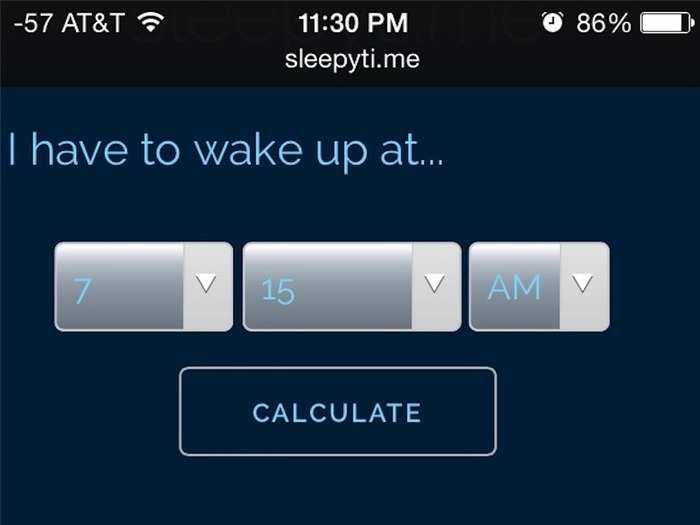
For the first night, I decided to go with the simplest app — Sleepyti.me. It works out the best time to fall asleep or wake up using the rapid eye movement cycle — the five stages that occur during sleep.
The first stage of sleep is the lightest and the deepest is the fifth, which occurs about 70 to 90 minutes after you fall sleep. Every night, you cycle through the five stages.
Because disrupting sleep during the REM state results in grogginess, Sleepyti.me tells you to schedule your alarm for when you're cycling through the lightest stages of sleep.
I wanted to wake up at 7:15 so headed over to sleepyti.me and plugged that in.
What happened when I tried out 5 different sleep apps over 5 nights
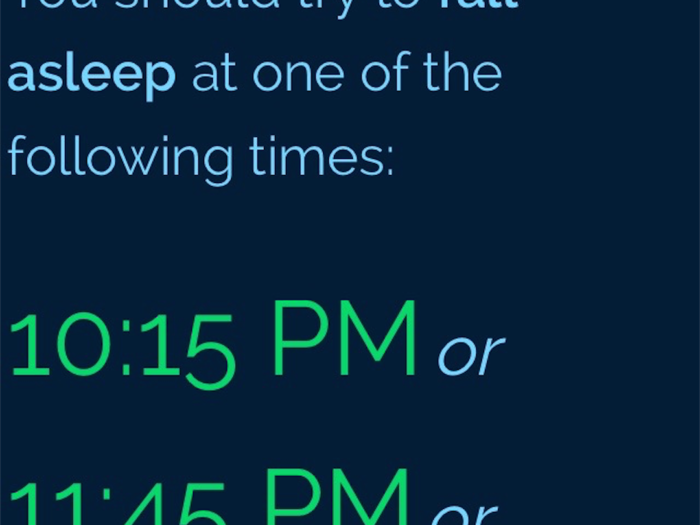
The app then selected the best time to fall asleep — either 10:15 or 11:45 — and recommended that I plan at least 14 minutes to fall asleep.
10:15 seemed a little early for me, so I faithfully fell asleep at 11:45.
While I should have netted about 7.5 hours of sleep based on sleepyti.me's planning, I actually got a terrible night's sleep, probably because I was anxious about getting to sleep and staying asleep.
Instead of sleeping peacefully through the night, I woke in stints and mentally took notes every time I did.
I usually get the worst week's sleep on Sunday nights, but this was a lot more pronounced.
Night 2: Sleep Cycle
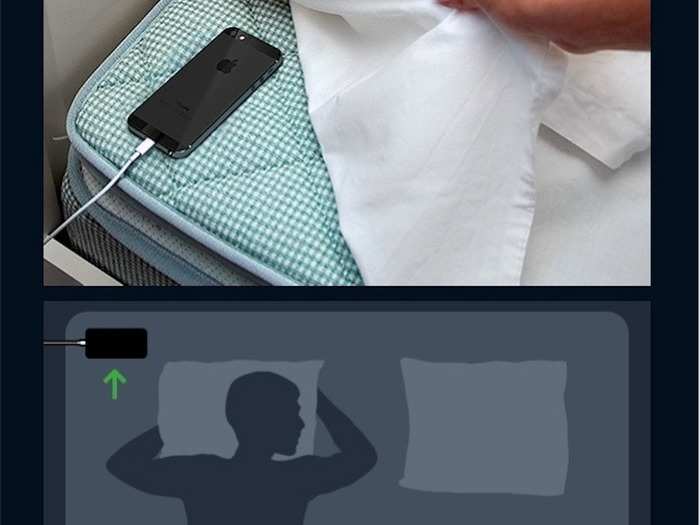
Because the previous night's sleep was so interrupted, I decided to opt for a sleep tracker for Night Two.
Using the phone's microphone and accelerometer, Sleep Cycle tracks sleep patterns. If you're awake or in light sleep, you're more likely to be tossing and turning.
Before I could set an alarm, I had to first test the placement on my bed. The 99-cent app instructed me to place my phone perpendicular to the pillow and to have it plugged in all night.
But the bedside I usually sleep on has no wall plug so I had to swap sides with my husband. The recommended placement also didn't leave much room for my phone, so I had to slightly tilt my pillow away because I didn't want my phone directly underneath, since that would have muffled any sound recordings.
After careful placement, I was instructed to flip from my back to my stomach, and despite my concerns, it detected my movements just fine.
What happened when I tried out 5 different sleep apps over 5 nights

By that point, I was so exhausted from the previous night that I immediately fired up the alarm. I chose to wake up at 7:00, around the same time as Monday morning.
Like Sleepyti.me, Sleep Cycle's alarm goes off when it estimates that you're at your lightest sleep, based on your movements. Instead of a specific time, though, it has a 30 minute window and goes off when it detects you're already moving around.
What happened when I tried out 5 different sleep apps over 5 nights

I woke up when the alarm went off, which increased in volume the longer it rang, and didn't feel groggy. After turning the alarm off, Sleep Cycle opened my stats.
I was worried that my phone wouldn't detect my movements from under my pillow but I was amazed at how accurate it was. I remember staying awake until about 11:30 and briefly waking again at 1 AM, exactly what the sleep graph showed.
I was pretty happy with the app, but that might have something to do with the fact that I a fairly solid eight hours of sleep and was in a good mood.
The Sleep Cycle app says it needs at least 5 nights of sleep to calibrate, so I was kind disappointed to have to move on to a different app, given how well it was already working.
Night Three: SleepBot
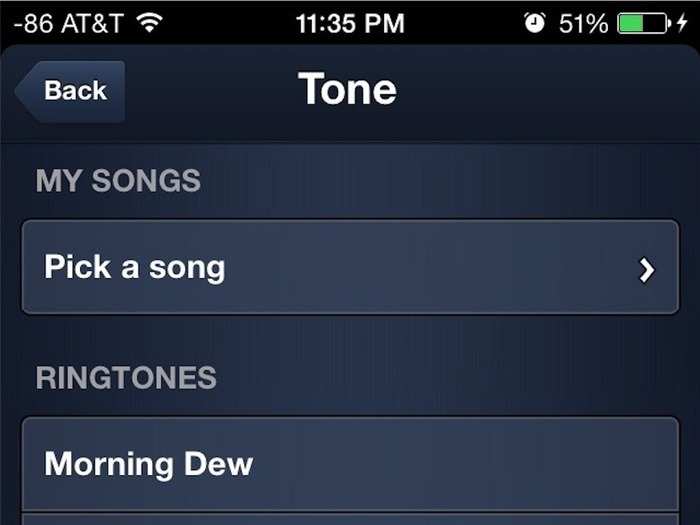
I moved on to a similar sleep tracker called SleepBot. The app had a lengthy tutorial but worked about the same as Sleep Cycle — it tracked your sleep quality using the iPhone's accelerometers and mic.
SleepBot didn't have any phone placement tests, like Sleep Cycle, and was simple enough to set up. It also allowed me to customize my alarm ringtone — I could choose one of the tones they provided or choose my own music. I ended up going with Beach House's "Wild."
What happened when I tried out 5 different sleep apps over 5 nights

Even though I was going to sleep later than the previous nights, I also had to wake about an 30 minutes earlier. I didn't expect to get much sleep this night.
Hopefully the few hours I had in bed would prove to be a quality night's sleep.
What happened when I tried out 5 different sleep apps over 5 nights

When I started to test these apps, I forgot about my terrible habit of hitting snooze over and over again. Though my alarm started going off at 6:30 AM, I hit snooze until about 6:52.
My snoozing might have had something to do with the fact that the song I choose has a sleepy, dreamy quality to it, and is not at all very alarming.
According to SleepBot, I got about 7 hours of sleep, but possibly because I snoozed for almost 30 minutes, I felt like I'd had a lot less.
What happened when I tried out 5 different sleep apps over 5 nights

SleepBot showed you the sound and movement recordings separately and one super cool feature allowed you to listen to the recorded sounds at specific times.
But because it slipped under my pillow and we had the air conditioner on all night, it was difficult to tell what the loud noise that woke me at 4:30 AM was. After repeated listening, it just sounds like a combination of muffled movement and AC noise.
Night Four: Motionx 24/7

Next up was Motion X 24/7. Unlike the previous sleep trackers, Motion X 24/7 asked me for personal details like my height, gender, and weight. For $0.99, however, it had a variety of other uses.
Using the iPhone's flash and camera lens, it could record your resting heart rate. This wasn't required to track sleep but I tested mine anyway.
What happened when I tried out 5 different sleep apps over 5 nights

The app is more all-purpose than many of the others.
Apart from tracking sleep quality and recording heart rates, it could also track power naps and keep track of your steps.
The power nap portions would have been useful earlier today, as I slogged through the day after last night's sleep.
What happened when I tried out 5 different sleep apps over 5 nights

Motion X 24/7 also allowed you to turn on and select a white noise that fades as you sleep. I kept it on even though the sounds of the AC unit completely overpowered the white noise.
The app recommends using an exercise armband to hold your phone to better track your movements and sounds during sleep, but I thought that might have taken "attached to your phone" to a whole new level.
Also I don't have an armband. So I used the same "on bed" method many of the other apps required.
What happened when I tried out 5 different sleep apps over 5 nights

The next morning, I opened up my stats. Even though I set it to go off at 6:30 to 7:00 AM, I snoozed until about 7:14.
Like Sleepbot, Motion X allowed you to listen to loud sounds that might have woken you over the course of the evening. All of the individual play button on the screenshot were different loud noises that the app picked up and recorded.
Unlike Sleepbot, I could tell exactly what they were. Even over the noise of the air conditioner, the app could detect an ambulance on the street at 2:30 AM, my husband's snores throughout the night, and one moment at 4:30 AM that I couldn't remember when I woke up laughing.
This feature is very helpful for figuring out what's keeping you awake.
Night Five: Sleep Better
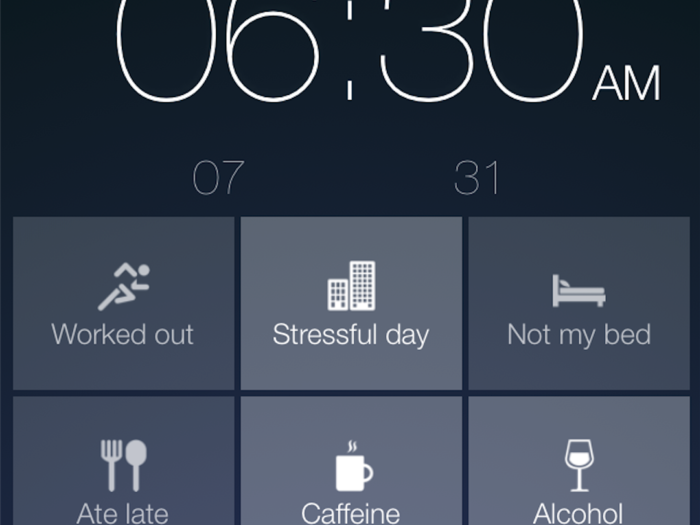
For the last night, I chose Sleep Better because it was free and had some features the other apps didn't.
Sleep Better incorporates information that can influence your sleep, like whether a full moon shines through your window and on your face (I personally deal with this every time there is a full moon), whether you exercised or had caffeine that day, and also a notepad feature to let you record your dreams when you wake up.
That last one is particularly helpful for me because I often have very vivid dreams and nightmares that wake me up in the dead of night, which would have been helpful if I could remember why I woke up laughing the night before.
What happened when I tried out 5 different sleep apps over 5 nights

Though I had set the alarm for 6:30, I snoozed all the way to about 7:30.
I didn't feel well-rested so I was confused when Sleep Better's stats noted that I had 95% sleep efficiency.
According to the app, I'd only been awake for 5% of the nearly 8 hours of time in bed. But I didn't feel rested at all. Unlike SleepBot, which was free, and the $0.99 Motion X 24/7 app, Sleep Better has $1.99 in app purchases.
All of those details hid behind that paywall, so I couldn't dig into the stats to see why I woke up throughout the night so many times. It's possible Sleep Better improves over time, but impossible to know for sure without paying for it.
What happened when I tried out 5 different sleep apps over 5 nights

I did like that it asked you to rate your sleep and make notes of any dreams or nightmares.
I had a few anxious dreams during my Sleep Better night, which may have contributed to all the red spikes on the previous graph and why I felt so tired the following morning.
... and the winner is ...
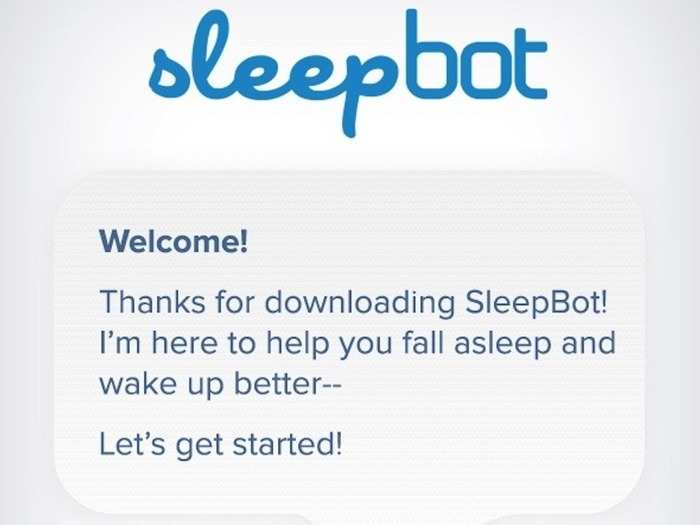
SleepBot was my favorite of the apps I tested.
It is free, easy to use, allows you to look at the sound and movement recordings separately (in the other apps, there was only one graph for both). It also let you listen to the audio recordings, and allowed me to customize my own alarm ringtone.
Thought I preferred SleepBot out of the five apps I tried, none of them seemed interesting or useful enough to keep using them.
Plus, the presence of the phone recording my sleep gave me performance anxiety when it came down to getting to sleep and staying asleep. Maybe that would go away with continued use but the benefits just weren't enough for me to risk any more sleepless nights.
Popular Right Now
Popular Keywords
Advertisement